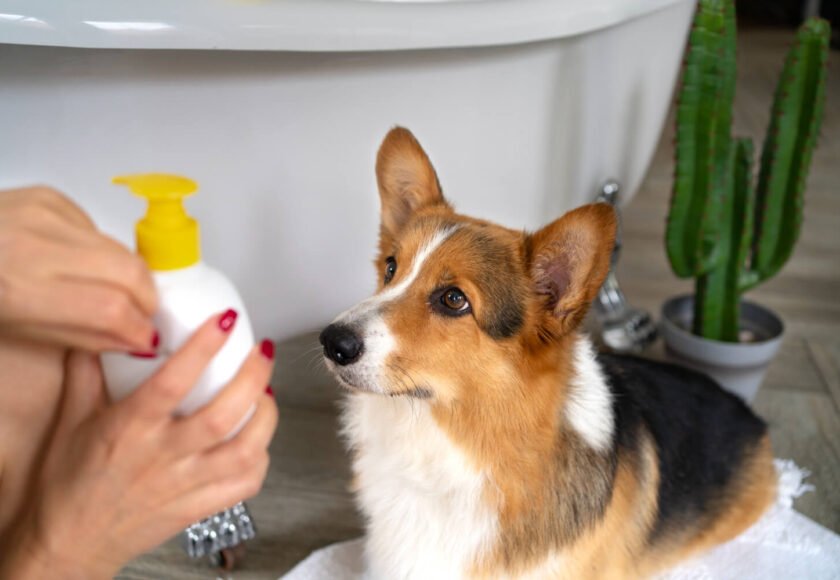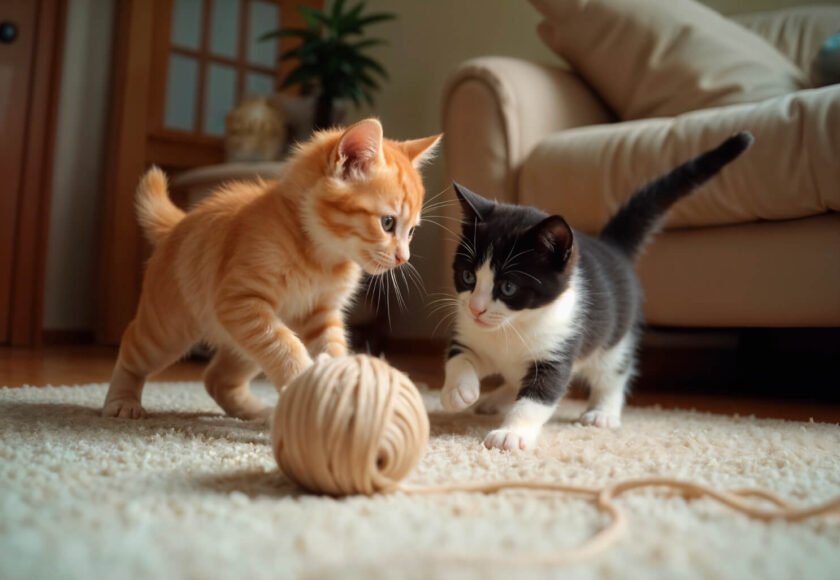You can be in trouble if you bring a squirrel into your house! Your squirrel would require new rules to be taught, just like any other pet. How would you train your squirrel to resist the urge to munch on the TV remote? What would happen if they tore up the curtains? Is there any chance you might talk your pet out of eating the furniture in the dining room? If your squirrel relieves himself on the kitchen floor, how would you respond?
That being said, squirrels are quite cute if you’ve ever had a close-up look at them. You may still find yourself drawn to a tiny, fluffy pet. Cartoon squirrels also appear to be highly intelligent.
Types of Squirrels
There are various types of squirrels which can be your possible pet. Here are a few:
1. Indian Squirrels (The Palm Squirrels):
The palm squirrel has a bushy tail that is somewhat shorter than its body, and it looks like a giant rodent in size. From head to tail, there are three noticeable white stripes on the grizzled, grey-brown back.
2. Ground Squirrels:
Ground squirrels are any long-bodied, terrestrial rodent species that are active throughout the day. They have small, rounded ears, powerful claws, short legs, and a short to medium-length tail. From gray, tawny, or mild brown to olive, reddish, or extremely dark brown, species’ colors differ greatly from one another.
3. Flying Squirrels
Flying squirrels more accurately describe them as “gliding squirrels” as, in contrast to bats and birds, they are not able to fly by means of powered flight. Squirrels in the air glide. They can glide through the air between trees because of a unique membrane that lies between their front and back legs.
4. American Tree Squirrel:
The tail and the eye ring are the two most distinctive features of the American red squirrel. The tail of the tree squirrel has a white border and is bushy and dark red in color. The rodent’s black eyes are surrounded by a thick, white circle known as the eye ring.
Natural Behaviour and Habitat of Squirrels
Squirrels like hiding, playing, and climbing. You might think about allowing your squirrel to come and go from your home as they are wild creatures. To make sure your home and backyard are secure for your new pet, you should do the following:
- Any tiny items that your squirrel might trip over and shatter while climbing should be stored.
- Plug tiny openings and store appliances that your squirrel can climb into and hide in.
- Protect chemicals and other harmful materials, such as prepared treats that your squirrel might consume.
- Until your squirrel gets used to their new surroundings, keep them apart from other pets.
- When other pets are around, keep an eye on your squirrel and never let them both alone.
Challenges of Keeping Squirrels as Pets
It is a destructive and highly energetic animal, the squirrel. They are larger than most rats used as pets and haven’t really been domesticated. They can therefore lead to a variety of issues.
It’s challenging to cage a squirrel. They need a lot of space to roam in order to stay healthy and happy, and because of their size and propensity to cover enormous distances, they are strong and persistent. Without it, they will concentrate their energies on causing havoc and are capable of escaping from many cages that you would have thought could contain them.
Squirrels will actively pursue exercising their innate impulses once they are released from their cages. Because they like to gnaw, squirrels can do damage to your house. In addition, if you’re not wearing protective gear, their long claws for climbing will cause holes and damage to everything in your house, even your arm.
Naturally, squirrels leave trash behind wherever they go. They will, however, spray and toss excrement and pee outside of their enclosure because they dislike messing around in their own cage.
Since they are wild creatures, squirrels lack the sense of attachment and closeness that domestic animals have developed over many generations of breeding and selection. They will therefore be more prone to bite you.
The squirrel owns you. If you want to go away, you will need to find a house sitter with a lot of patience and a high pain tolerance. Even overnight outings require a house sitter.
Benefits or Rewards of Keeping Squirrels as Pets
Here are the benefits for having Squirrels as pet:
Ecological Role: Squirrels contribute to plant diversity and forest regeneration through seed dispersion.
Control of Pests: By feeding on insects, they can aid in the management of pest populations.
Educational Value: Learning about the behavior of animals, the environment, and the significance of wildlife can be obtained via squirrel observations.
Biodiversity: They enhance an area’s biodiversity and support a healthy environment by being present.
Unique animals, squirrels can impart important life lessons to us through their diverse range of abilities and habits. They add something significant and fascinating to the natural environment with their intelligence, dexterity, and ecological contributions.
Considerations for Getting a Pet Squirrel
Assume the role of a squirrel caregiver. Being untamed, squirrels are wild creatures. Remember that wild squirrels need special care if you find yourself taking care of one or if you’re looking to adopt one as a pet. Then contact a veterinarian to examine your squirrel. Raising a squirrel involves dedicating yourself to it for the rest of your life. The instincts that a squirrel has to live in the wild are lost once it is domestic.
1. Getting ready for squirrels in your house:
Squirrels like hiding, playing, and climbing. To make sure your home and backyard are secure for your new pet, you should do the following:
- Any tiny items that your squirrel might trip over and shatter while climbing should be stored.
- Plug tiny openings and store appliances that your squirrel can climb into and hide in.
- Protect chemicals and other harmful materials, such as prepared treats that your squirrel might consume.
- Until your squirrel gets used to their new surroundings, keep them apart from other pets.
- When other pets are around, keep an eye on your squirrel and never let them both alone.
2. Accommodations for Squirrels:
As far as your squirrel has protection from predatory animals, you can build a cage that can be placed either indoors or outdoors. Regular cages—such as those used for hens and rabbits—don’t always work because squirrels may fit through tiny openings.
3. Giving your squirrel food:
Eating the same foods that your pet squirrel would in the wild is the best way to feed them. This comprises:
- Pinecones
- Seeds
- Mushrooms
- Buds and flowers
- Berries
- Acorns
- Cashews
- Candies
The opportunistic eaters that squirrels are. They will consume anything put in front of them. You are responsible for making sure kids eat a balanced diet. Although cake, snacks, and other processed meals that humans enjoy are enjoyed by squirrels, they are unhealthy for them. Poor eating habits can cause unpleasant stomachs and obesity.
Can Squirrels Be Pets?
Considering their intelligence, squirrels are not considered to be very trainable due to their untamed nature. Using the restroom. If your squirrel is a newborn, you will need to provide it care around-the-clock, which will involve encouraging it to relieve itself. A moist cotton ball can be used to gently massage your squirrel’s behind several times a day in a circular motion.
General instruction for your squirrel. Even though squirrels are hard to train, you can gradually create habits by rewarding particular behaviors.
Related Blog: A Comprehensive List of Popular Pet Animals
FAQs About Squirrels as Pets
Q1. What must be taken into account prior to obtaining a pet squirrel?
Speak with a veterinarian to have your squirrel examined. Get ready to handle a squirrel’s care. Wild, untamed animals are squirrels. Remember that squirrels require particular care if you choose to adopt or care for a wild squirrel as a pet. To protect against raptors, you can build a cage that can be kept both indoors and outside.
Q2. What do squirrels eat?
Never provide cake, snacks, or other processed goods to squirrels. Salts, sugars, and other ingredients that are bad for wildlife are frequently included in these. Give them natural things that they eat on a regular basis. In the wild, they usually eat a variety of nuts, fruits, and seeds; attempt to replicate this diversity in your offerings.
Q3. What kind of housing do squirrels need?
The best type of wire to keep your squirrel secure and also give them room to climb around is a mesh one. The squirrel needs the cage to protect it from other creatures, such as predators, which is why it is important. Squirrels are the most active during the day, it’s good to have them in the backyard for some refreshment, but if they have been in a cage for a long time, they might have forgotten the survival instincts. It’s quite important to keep an eye on them while they are out.
Q4. What health issues do pet squirrels face?
Squirrel fibroma, sometimes known as squirrel pox, is a common viral disease that infects squirrels. Bite wounds from insects, including mosquitoes, are how the virus is transmitted. The virus causes skin tumors to appear on the body. Typically, these tumors cause no other problems for the squirrel unless secondary skin infections develop. Occasionally, the tumors may spread to the lungs, liver, kidney or lymph nodes. If the squirrels in your backyard appear to be balding, notoedric mange may be responsible. Another cause for squirrel balding is fungal infections, or dermatophytosis. Fungal infections leave hair brittle, causing it to break off and leave short stubble, making the squirrel appear bald.
Q5. Do squirrels need vaccinations or special medical care?
As wild animals, they don’t need vaccinations. But, as pets, checking into the following can help. Keeping an eye on their appetite, appearance, and their behavior. Providing a proper diet rich in nuts, vegetables, and fruits. Finding a veterinarian with experience in treating wildlife or exotic animals is important. They might need specific care or treatment that standard veterinary practices might not offer it is advisable to see wild squirrels from a distance and stay away from close quarters Taking everything into account, it should be mentioned that even though wild squirrels are immune to disease, it still requires specialist knowledge and equipment to care for a pet squirrel or rescue a wounded one.
Conclusion
As pets, squirrels might be fascinating and adorable, but they also present certain difficulties. Despite being energetic, bright, and fascinating animals, they are challenging to completely domesticate due to their untamed tendencies and mannerisms. Due to their need for plenty of room to roam, squirrels may do damage to your home as they chew and climb. They also require particular care, such as a safe, roomy cage and a balanced meal that closely resembles their natural food sources.
Because squirrels are wild animals, training them can be difficult. Their excessive energy can be tiring, and they have a tendency to chew on furniture and make messes. For optimal care, they frequently require a veterinarian with experience with exotic animals, and their diet needs to be closely monitored to prevent health problems.
Even though they make interesting and charming pets, domesticating squirrels can be difficult due to their natural nature. Their high energy levels, desire for lots of room, and innate chewing and climbing tendencies can cause significant damage to a house and make training them challenging. A well-designed cage and a diet that closely resembles their natural food sources are two necessities. In addition, specialist veterinary treatment is frequently needed for their care.



